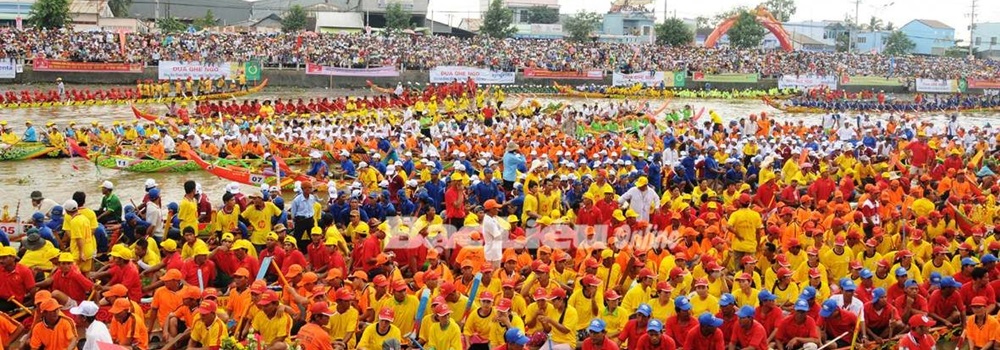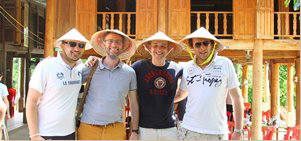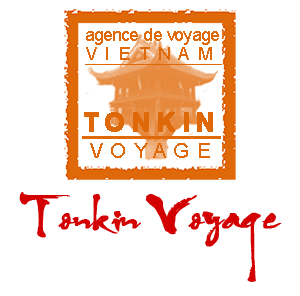Most of the festivals and traditional cultural events of Vietnam are in accordance with its lunar calendar. Traveling to Vietnam during traditional festivals and holidays is a great experience to have a deep insight of Vietnamese culture and custom.
Here below is the list of traditional festivals and holidays in Vietnam.
I. FESTIVALS
1. Khau Vai love market festival – Ha Giang, ~ 400 km from Hanoi, 200 km from Ha Giang city (26th and 27th in the third lunar month)
Khau Vai is a love market for various ethnic minority groups from four mountainous districts in Dong Van Plateau and ethnic minority groups in communes adjacent to Bao Lam and Bao Loc districts of Cao Bang province.
Highlights: this market is a meeting place for ex-lovers. You will have a great chance to see ethnic costumes, jewelry, ethnic musical instruments, culture and art publications and enjoy some traditional games and exciting activities.
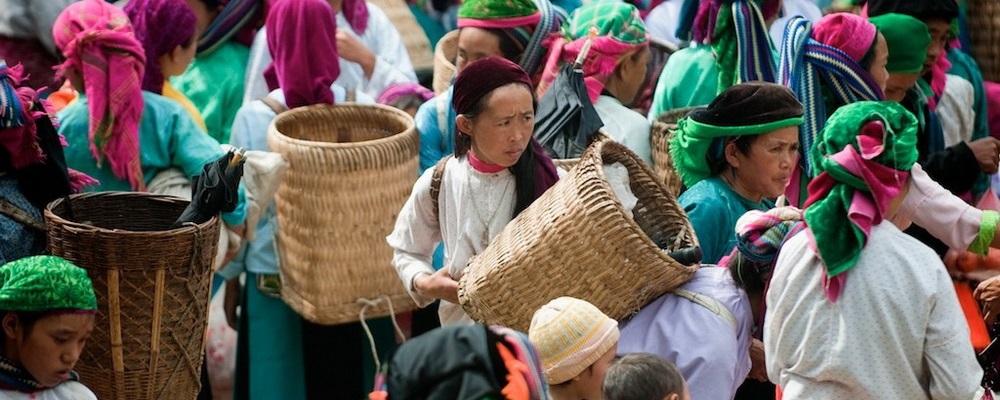
2. Hung Kings Commemoration Day – Phu Tho (from 8th to 11th day of the third month in Lunar Calendar)
This is to honor the Hung Kings. According to historical records and Vietnamese traditions, the Hung Kings were the founders of Vietnam. Hung Kings Commemoration Day is oriented around the themes of filial piety, ancestor worship, and patriotism.
Highlights are special traditional cultural activities are conducted, Xoan singing performance in Thuong temple, ca Tru (Vietnamese classical opera) in Ha temple, bamboo swing and traditional games are played.
It takes place annually on Nghia Linh Mountain in Phong Chau district, Phu Tho province.
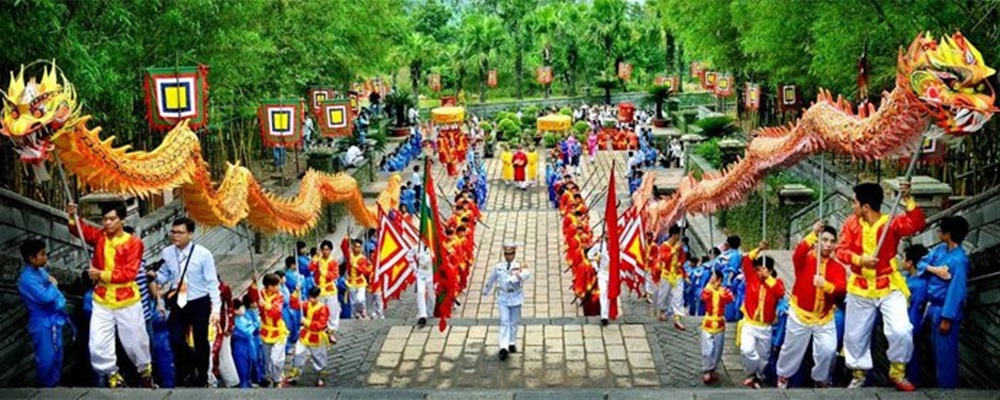
3. Bai Dinh Pagoda Festival – Ninh Binh (from 6th day of the lunar first month and lasts till the end of the third lunar month)
This festival is the perfect start for pilgrimages towards the imperial capital Hoa Lu, Ninh Binh province.
Highlights: Bai Dinh pagoda festival includes 2 parts.
The first, it is the celebration of the Buddhist, Cao Son sacrifice, and Mau Thuong Ngan. The second part includes folk games, visiting caves, temples sightseeing, enjoying Cheo, Xam, Ca Tru.
The most famous places: New Bai Dinh area, three entrance gate, bell tower, Tam the temple, Quan Am temple, Phap Chu temple, ancient Bai Dinh pagoda
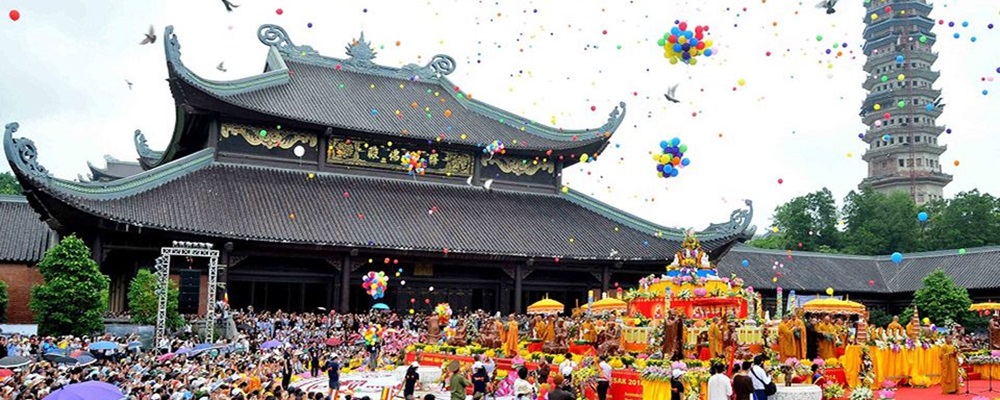
4. Huong Pagoda Festival – My Duc, Hanoi (70 km ~ 2-hour drive from Hanoi) (6th of the first lunar month to the end of the third lunar month)
Huong Pagoda Festival is among the greatest Buddhist festival in northern part of Vietnam. Huong Pagoda Festival plays an important role in the spiritual life of Vietnamese people in general and Vietnamese Buddhists in particular.
Highlights: there are 2 parts: the ceremonies and the entertaining activities including boat trip along Yen Stream, climbing Huong Tich mountain and exploring holy caves. Boat trip passing beautiful limestone karst, rivers and rice paddies is the most outstanding feature of this place.
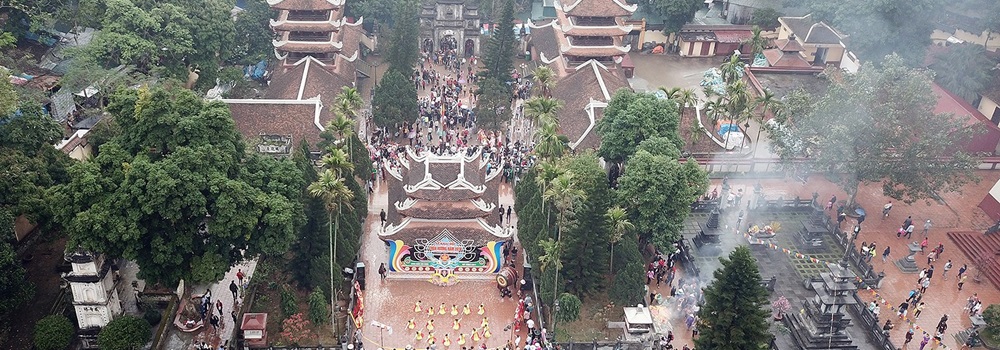
5. Co Loa Citadel Festival – Dong Anh, Hanoi (6th to 16th day of the first lunar month) (20 km ~ 40 minutes drive)
People from 12 villages gather for the festival to celebrate the foundation of Hanoi Citadel.
Highlights: religious masses and lots of traditional games and activities, such as throwing a sacred ball through the ring, Quan ho singing, wrestling, rice cooking competition
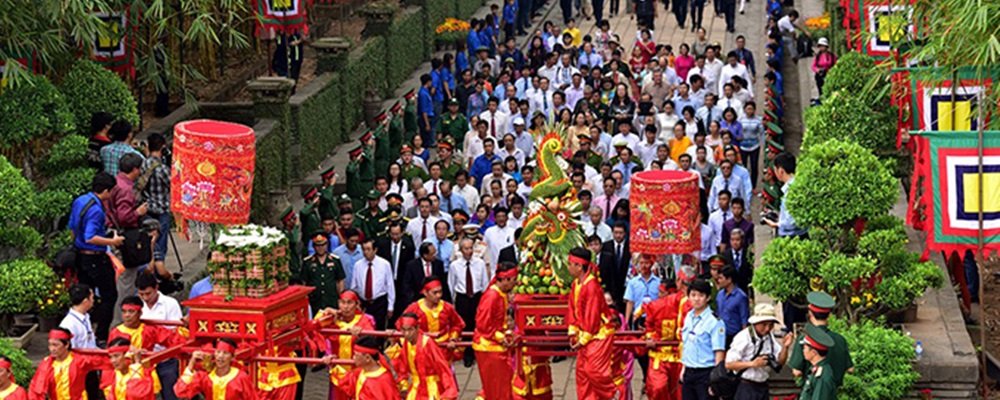
6. Lim Festival – Bac Ninh ~ 20 km from Hanoi, 40 minute-drive,13th of the first lunar month.
About twenty kilometers away from Hanoi, Lim Village of Bac Ninh province is the “hometown” of Quan Ho folk songs, one of Vietnam’s intangible cultural heritage. In order to enhance and promote the tradition of Quan Ho singing, Lim Festival is eagerly celebrated among local residents as well as pilgrims from every part of the country around the 12th or the 13th day of the first Lunar month.
Highlights: Singing Duo of Love Songs and making friends, folk games (bamboo swings, wrestling, cocks fighting, tugging war, blindman’s buff, human chess, pot beating, weaving)
Tips: A half day trip is enough to visit this site.
How to get there: take a taxi from Hanoi city center or rent a motorbike for this interesting place.
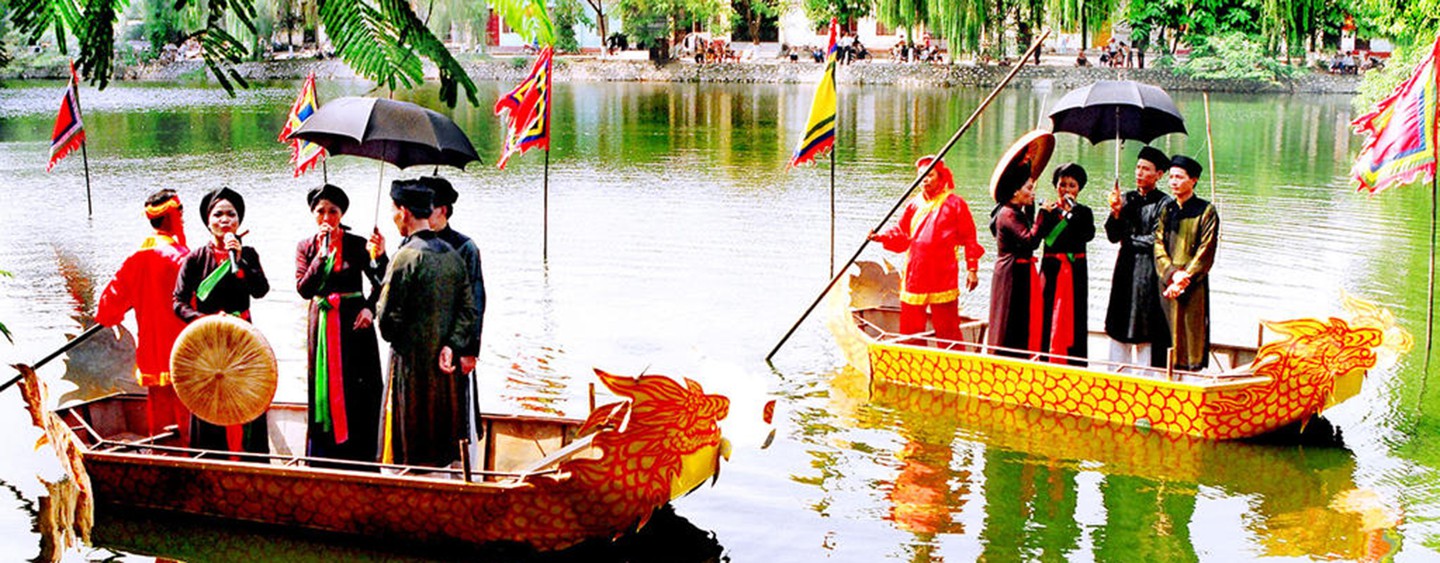
7. Vu Lan Festival (15th of the seventh Lunar month)
Some people call it Vu Lan or Vietnamese Mother’s Day.
In Vietnamese, it is so-called “Xa toi vong nhan” festival because this is the day for the death’s souls
In the thought of Vietnamese as well as people in many other countries sharing the same festival, on that day, the gate of the hell opens and thus, souls of the dead can come back to their home and gather with family. Vietnamese considers that it’s an occasion for all families gathering as well as expressing love and gratitude to ancestor and parents.
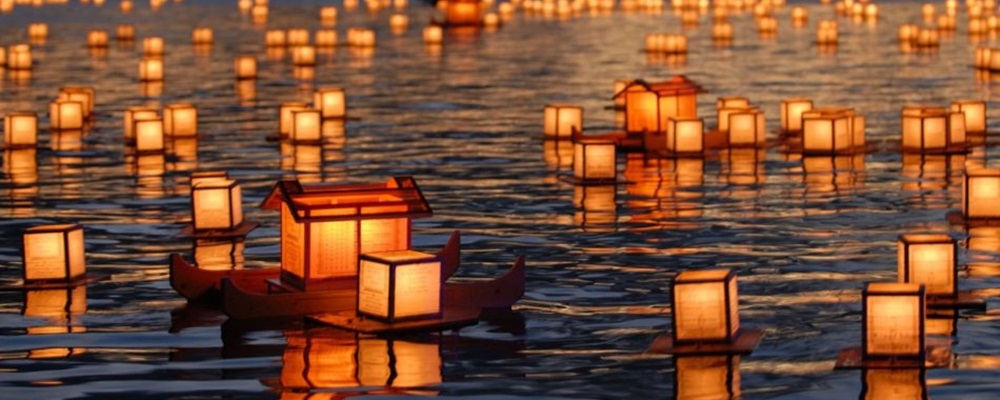
8. Mid-Autumn’s Festival (15th of the eighth Lunar month)
Mid-Autumn (Trung Thu) is the day when the moon is at its brightest in a year.
Highlights: In Vietnam, the Mid-Autumn Festival is the happiest day for children, during which parents buy their children various types of lanterns, snacks, and funny masks. Various activities are held to celebrate the Mid-Autumn Festival in Vietnam. The main activities include worshiping the God of Earth, carrying carp-shaped lanterns and watching a lion dance parade.
In addition, a variety of interesting literary and art activities are held throughout Vietnam during the Mid-Autumn Festival, as well as offering sacrifices to dragons, dragon boat races, and lantern fairs, adding much luster to the festival
Highlights: a lavish tray with various delicious dishes and votive as well is set on an ancestral altar. The householder, as usual, will burn incense and invite ancestor to come back home and celebrate the festival with family. At night, Vietnamese hold a ceremony of releasing lighted lanterns on the river. Watching the moon, eating moon cakes, joining Lion Dane parade and carrying lanterns.
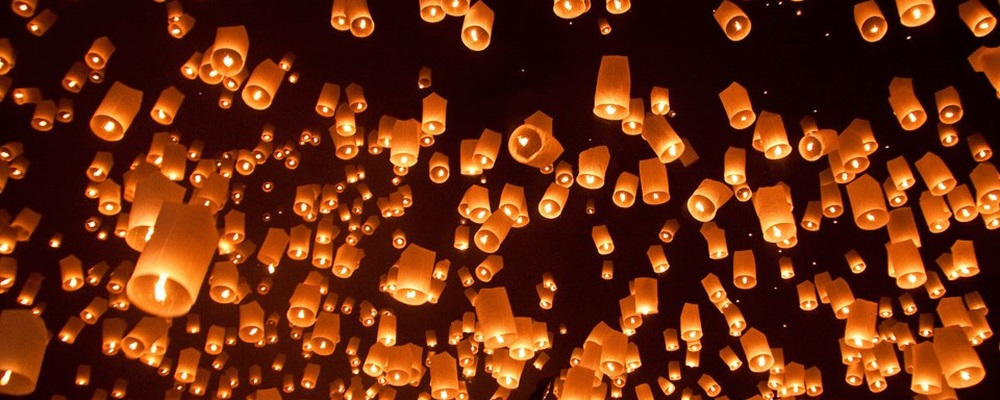
II. HOLIDAYS
1. New Year’s Day – January 01st
Most of the festivals, anniversaries and traditional cultural events of Vietnam are in accordance with its lunar calendar. Annually, joining in the modern breathes of the world, Vietnam also celebrates the International New Year Day on the first day in Western Calendar – January 1st.
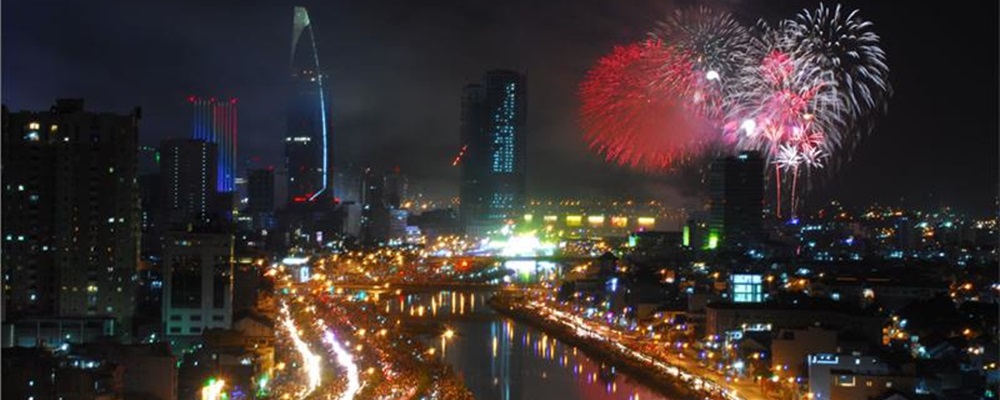
2. Tet Holiday or Lunar New Year (1st, 2nd and 3rd day in Lunar Calendar ~ Late January and early February)
Lunar New Year is the most important festival in Vietnam. Vietnamese people often spend about nearly a month to celebrate this special event.
Highlights:
- People will spend a few days cleaning their homes, polishing every utensil, or even repaint and decorate the house with kumquat tree, branches of peach blossom, and many other colorful flowers.
- The ancestral altar is especially taken care of, with careful decoration of five kinds of fruits and votive papers, along with many religious rituals. Everybody, especially children, buy new clothes and shoes to wear on the first days of New Year. People also try to pay all their pending debts and resolve all the arguments among colleagues, friends or members of family.
- Red and yellow can be seen everywhere in Lunar New Year. People consider what they do on the dawn of Tet will determine their fate for the whole year, hence people always smile and behave as nice as they can in the hope for a better year.
- Gifts are exchanged between family members and friends and relatives, while children receive lucky money kept in a red envelope.
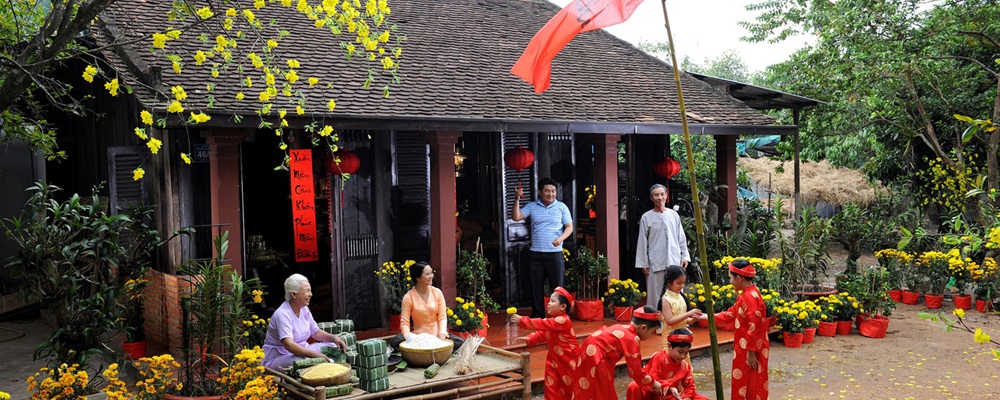
3. Reunification Day – April 30th and International Labor Day – May 01st
In the history of Vietnam, April 30th, 1975 is the day that marks the fall of Saigon government, ending the Vietnam War and leading to the liberation of Vietnam’s southern part.
Highlights: In most big cities, every house flies a Vietnamese flag. An early morning street parade may close some of the city streets, and at the least expect the streets to be full of people on holiday. Firework performance can be seen in some big cities such as Hanoi or Ho Chi Minh city.
Together with more than 80 countries all over the world, the International Workers’ Day, as known as International Labor Day or May Day in Vietnam, is a public holiday of the nation. It is celebrated on the first day of May, right after the Reunification Day; as a result, the two holidays are normally joined together into one break.
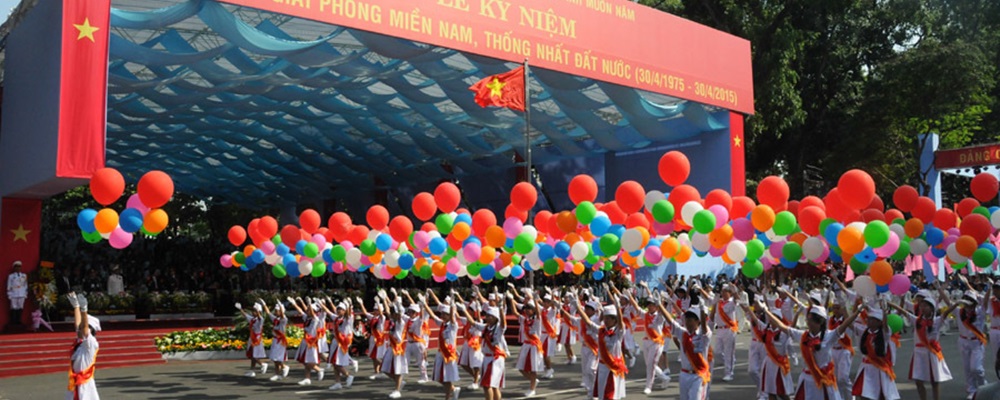
4. National Day – September 02nd
To any country, Independence Day is an important historical, political or cultural event associated with its current status. In most nations, this holiday originally leads to the birth of the country. In Vietnam, National Day is celebrated on 2 September. National Day marks Vietnam’s declaration of independence from France.
Highlights: there are speeches, parades, fireworks, and other festivities across the country, with a large march in Ba Dinh Square in Hanoi, where the declaration of Independence was made. This is a very patriotic holiday with the national flag of Vietnam displayed everywhere and large posters of Ho Chi Minh (‘Uncle Ho’) adorning city walls
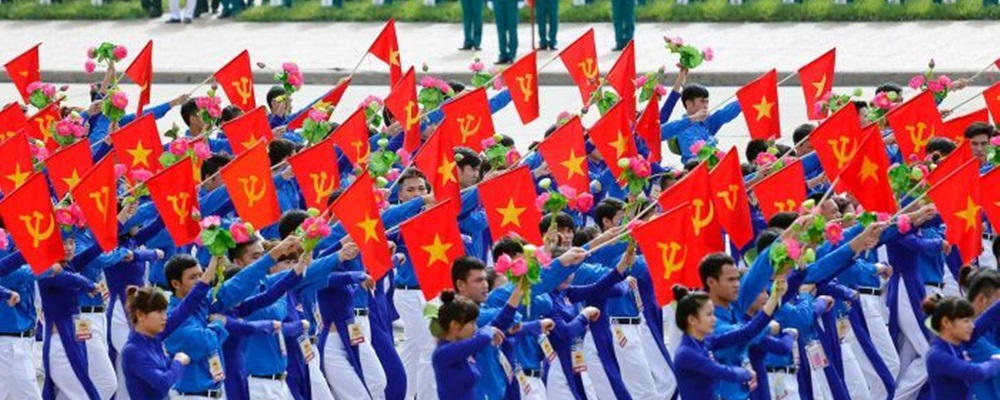
Travel Guide
-
Before you travel
- Airports in Vietnam: 2025 Traveller’s Guide
- Tips for Internal Flights in Vietnam
- Who is Waived Vietnam Visa
- Vietnam, Cambodia, Laos, Thailand, Myanmar: Which Country Should You Visit?
- Health and medical information
- Vietnam – An Ideal Wellness Destination
- Food Allergy/Intolerance in Southeast Asia
- Top Best Hiking Trails in Vietnam
- Top Recommended Hospitals For Travellers In Vietnam
- Best Places For Hiking And Trekking In Vietnam
- During the trip
-
Others
- Phu Quoc vs Nha Trang vs Mui Ne vs Con Dao (2025)
- Vietnam Resorts for Families: Perfect Getaways for All Ages
- Travel guide for Seniors to Vietnam & Asie du Southeast Asia
- Interesting Differences of The 3 Regions of Vietnam
- The Golden Bridge in Ba Na Hills Makes the Booming in the World Tourism
- Halong vs Bai Tu Long vs Lan Ha Bay
- Trang An or Tam Coc or Van Long?
- Top Hidden Island Getaway In Vietnam
- A Dreamy Glance of Vinh Hy Bay
- The Best Historical Sites in Vietnam
